Matt Rees's Blog - Posts Tagged "palestinian"
In new Palestinian crime novel NYC dangerous as West Bank
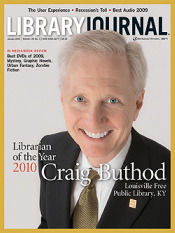 In the current Library Journal, my new Palestinian crime novel, THE FOURTH ASSASSIN (out Feb. 1) gets a good review that highlights the themes and implications beyond the resolution of the mystery. For those who have no copy of the magazine (in which case you may have missed Librarian of the Year -- Way to go, Craig Buthod of Louisville, Ky.) here's THE FOURTH ASSASSIN review: "In New York City for a UN conference, Omar Yussef goes to Bay Ridge, Brooklyn, home to a large Palestinian community, to visit his son and finds a beheaded body in his son's apartment. With no alibi, his son is arrested, and Omar finds that the streets of New York are as treacherous and dangerous as those of Bethlehem. VERDICT Journalist Rees's fourth Omar Yussef outing (after The Samaritan's Secret) exposes the political struggle among various Palestinian factions and demonstrates why it is so difficult to find a solution in the troubled region. His sleuth might miss the ancient streets of Bethlehem, but the hatred and tension of the Middle East follow the Palestinian wherever he goes."
In the current Library Journal, my new Palestinian crime novel, THE FOURTH ASSASSIN (out Feb. 1) gets a good review that highlights the themes and implications beyond the resolution of the mystery. For those who have no copy of the magazine (in which case you may have missed Librarian of the Year -- Way to go, Craig Buthod of Louisville, Ky.) here's THE FOURTH ASSASSIN review: "In New York City for a UN conference, Omar Yussef goes to Bay Ridge, Brooklyn, home to a large Palestinian community, to visit his son and finds a beheaded body in his son's apartment. With no alibi, his son is arrested, and Omar finds that the streets of New York are as treacherous and dangerous as those of Bethlehem. VERDICT Journalist Rees's fourth Omar Yussef outing (after The Samaritan's Secret) exposes the political struggle among various Palestinian factions and demonstrates why it is so difficult to find a solution in the troubled region. His sleuth might miss the ancient streets of Bethlehem, but the hatred and tension of the Middle East follow the Palestinian wherever he goes."
Published on January 19, 2010 05:37
•
Tags:
bay-ridge, bethlehem, brooklyn, crime-fiction, kentucky, library-journal, louisville, manhattan, matt-beynon-rees, middle-east, mystery-fiction, new-york, omar-yussef, palestinian, reviews, the-fourth-assassin, the-samaritan-s-secret, u-n
Who'll play Omar in the movies...?
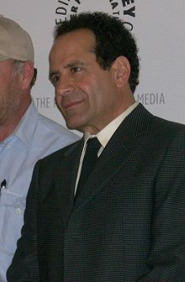 On the My Book, The Movie blog, I was asked to write about who I'd choose to play Omar Yussef in the movies. Here's what I wrote:
On the My Book, The Movie blog, I was asked to write about who I'd choose to play Omar Yussef in the movies. Here's what I wrote:I had no need to think of an actor. Not until I’d finished writing the book. Then the thinking really started.
The Palestinian sleuth who's the hero my books, Omar Yussef, is based on a real Palestinian friend of mine who lives in the Dehaisha Refugee Camp on the edge of Bethlehem in the West Bank. I had no problem visualizing him when I wrote about Omar, because I saw him most days. We spent a lot of time together and, with a gentleman as frequently cantankerous as my real-life chum, believe me, I got the full tour.
Then came publication of the first of my Palestinian crime novels, The Collaborator of Bethlehem. The estimable Marshal Zeringue invited me to write a post for this blog. Instead of having a famous actor always in mind, I had to run through potential candidates.
My wife insisted Pacino was just right for Omar. But I preferred the quiet, gentle Swiss actor Bruno Ganz – who proved he could do cantankerous when he played Hitler a few years ago in Downfall.
At the Leipzig Book Fair last year, my Berlin-based film agent chatted with me about some negotiations with a German tv channel which wanted to make a series based on Omar. As we talked, crowds of local kids dressed in “Manga” costume milled about (apparently this is some Japanese animation thing that has cult dressing-up status among people young enough to make me feel very old.) He asked if I had an actor in
mind for Omar. I mentioned Ganz.
“No, it won’t work,” Roland said.
“Why not?” I asked, as I was bumped from behind by some German kid dressed up as a vampire samurai.
“He’s not Arab. It really ought to be an Arab. But it’s difficult to find an Arab actor who’s well-known enough to carry a production and also speaks German.”
“So Pacino’s out too, I guess.”
“Well, movies are different from tv,” he said, “and if it sold in America, things might be different, too.”
I think they might be different now that The Fourth Assassin has been released. In this new installment of my Palestinian series, Omar comes to New York for a UN conference, only to uncover an assassination plot. The suspect: his own son.
I’d guess the New York setting might make the series seem just that little bit less dauntingly foreign – without betraying its core and making it into just another American detective story.
Which leaves me free to name names.
So here it is: Tony Shalhoub. He showed great dramatic range in The Siege, which was written by Lawrence Wright, a journalist colleague of mine who later won a Pulitzer for The Looming Tower, a nonfiction account of the story behind the 9/11 terrorists. Shalhoub had a nice cameo in 1408, an otherwise typically over the top Stephen King thing. I don’t really watch tv, but I gather Monk is great.
Oh, and I forgot to mention: Tony Shalhoub’s an Arab. He’s descended from Lebanese immigrants.
I hope that’s good enough. I mean, don’t make me find an actor big enough to carry a Hollywood movie who’s actually Palestinian…
Published on February 15, 2010 01:43
•
Tags:
1408, actors, al-pacino, brooklyn, bruno-ganz, crime-fiction, film, lebanese, leipzig-buchmesse, manga, monk, movies, my-book-the-movie, new-york, omar-yussef, palestinian, pulitzer-prize, stephen-king, the-collaborator-of-bethlehem, the-fourth-assassin, the-looming-tower, the-siege, tony-shalhoub
Espionage is a dirty business
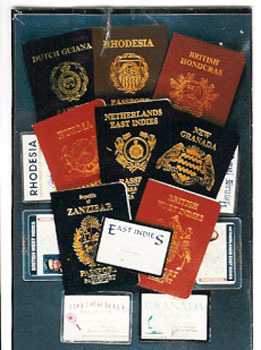 You’d think there was something wrong with spying.
You’d think there was something wrong with spying.People pay rather a lot of money to watch Daniel Craig dispose of villains in the bloodiest fashion. They nod in approval when M pushes 007’s perfect false passport across the desk. Yet everyone seems to be peeved about what in all likelihood is a Mossad hit against a Hamas operative in his Dubai hotel room on January 20.
Oh, that’s right, because the Hamas guy – meanies though Hamas might be – was a real human being who’s now dead, after all.
No, wait, that isn’t it. Western governments don’t really care about dead Arabs. If they did, they wouldn’t have sent Tony Blair to be the Middle East peace-process point man for the Quartet (the UN, the US, the EU and Russia), even though it ought to be perfectly clear that the only person disliked more in the Arab world than the stammering King of Cool Britannia is the future head librarian of the Presidential Library in Crawford, Texas. (Why so unpopular? Started a war that killed a lot of Iraqis, that’s why. Arabs do care about dead Arabs…sometimes.) So it isn’t the dead guy that’s behind the international fuss.
Ah, that’s right. These spies used our passports. Of the 11 assassins identified by Dubai’s police chief this week, all were carrying British, Irish, German or French passports. Three of the British passports carried the near-perfectly correct details of three Brits who’ve also taken up Israeli citizenship. Three others included names similar to European-Israeli citizens, though other details were incorrect.
To a crime novelist, the passport thing seems pretty tame. I suspect that, actually, the Euro pols and dips would like to lambaste Israel for the hit itself. They can’t quite bring themselves to do it, because, after all, Islamic extremism is the West’s current Enemy Number One. And whatever you think of Hamas, they’re into Islam and they’re pretty extreme. So the passport shenanigans get to be the focus of Euro ire.
I can understand why European governments will feel the need to throw a diplomatic hissy fit. But they’re wasting their time on the Israelis. In Israel you can throw a real, full-on hissy fit in public at some outrageous slight, and your Israeli target will simply go blank-faced and turn away, as though you’re the one who’s gone too far. The diplomatic version is laughably unsuited to the Middle East.
In other words, diplomacy in this region is pointless. You want someone to get a message, you kill.
If that sounds like the world of crime fiction, then that’s why this neighborhood is so well-suited to the genre. That’s why my Palestinian crime novels are a better way to understand the reality of this place than the international pages of your newspaper (which, you can be sure, will be running stories in which diplomatic protests by Whitehall and the Quai d’Orsay are taken seriously, rather than being treated as the piffling waste of time that they truly are.) Don’t take them seriously. Get yourself a novel instead.
(I posted this on the International Crime Authors Reality Check blog).
Published on February 18, 2010 22:46
•
Tags:
007, assassin, crime-fiction, daniel-craig, dubai, espionage, hamas, hitman, james-bond, middle-east, mossad, palestine, palestinian, spying, tony-blair
Palestinian sex-for-favors scandal
Was Israeli intelligence really behind the video showing an Abbas aide soliciting sex? (I posted this on Global Post.)
Devotees of Jamaican reggae singer Shaggy will already be familiar with the strategy of a Palestinian official caught with his pants down — to tell the truth, with his pants entirely off — in a sex scandal last week.
On his 2001 hit disc “Hot Shot,” Shaggy tells a friend caught in flagrante delicto to “Say it wasn’t me” when his girlfriend discovers him naked on the bathroom floor with another woman. That’s just what the Palestinian leadership is doing on behalf of Rafik Husseini, bureau chief to Palestinian President Mahmoud Abbas.
Husseini was recorded on a hidden video camera stripping naked and attempting to persuade a Palestinian woman to get into bed with him (though one may assume the bathroom floor would’ve done just as well for him.) She had, as far as he knew, come to him needing a job in his office. In fact, the assignation was a sting.
But a sting by whom?
Like everything else in the world of the Palestinian Shaggies, by Israel of course. Except that it most likely wasn’t. That’s just the automatic reaction of Palestinian leaders — like the leadership of much of the Arab world — when they want to discredit someone.
In fact, the sting was set up by Fahmi Shabaneh, head of a Palestinian intelligence unit investigating corruption.
The video that Shabaneh gave to Israeli television shows Husseini disrobing and getting into bed. He speaks to a woman who isn’t seen in the shot: “Do I turn off the light or do you?"
The clip resulted in Husseini’s suspension for soliciting sex in return for favors. His boss, President Abbas, announced a commission to investigate allegations that this wasn’t the first time Husseini used his position to coerce sex.
Husseini’s defense has been to argue in a statement that he’s being targeted by unnamed organizations. He doesn’t mention Israel, but other Palestinian leaders and the Maan news agency have directly accused Israel of being behind the video. Israel’s intention, the argument goes, is to embarrass Husseini’s boss, because Abbas refuses to return to peace negotiations until Israel truly does halt construction in its West Bank settlements.
Undoubtedly Israel isn’t shy of dirty tricks. The government of Dubai this week released details of the team of assassins who killed a Hamas operative there Jan. 20 in his hotel room. The European passports the assassins carried were, in some cases, in the name of current British-Israeli citizens (who all deny involvement and whose faces don’t match the photos released by Dubai).
The track record of Israel’s foreign intelligence organization, the Mossad, would suggest that this was, indeed, an Israeli operation. So does the response of respected intelligence columnists in the Israeli press, whose response to the international outrage about the falsified passports could be summed up as, “So what? We got away with it — not that we’re saying it was us.”
There might possibly be some hidden level of Israeli involvement in Shabaneh’s case. But anyone with knowledge of recent Palestinian politics will understand that the Ramallah leadership has never needed Israeli help when it comes to corruption or infighting.
Shabaneh has been held for some months by Israel for operating as a member of the Palestinian General Intelligence Service while a resident of Jerusalem, which is under Israeli control. The heart of Husseini’s defense is that, while in custody, Shabaneh agreed to give the Israelis dirt that would discredit Abbas’ office.
That might fly if the Israelis had set Shabaneh to entrap Husseini. But Shabaneh was acting under the orders of his boss in General Intelligence, Tawfik Tirawi. And Shabaneh says he showed the incriminating video to Abbas himself a year ago, before his own detention, and the Palestinian president refused to take action against Husseini.
Palestinian politics is forgiving of those discovered to be corrupt, because of the Shaggy defense (“No, that was an Israeli agent on the bathroom floor. It wasn’t me.”) Husseini’s hope is that discrediting Shabaneh will rescue him. But he’ll probably have more trouble than the Mossad getting away with this particular piece of wickedness.
Devotees of Jamaican reggae singer Shaggy will already be familiar with the strategy of a Palestinian official caught with his pants down — to tell the truth, with his pants entirely off — in a sex scandal last week.
On his 2001 hit disc “Hot Shot,” Shaggy tells a friend caught in flagrante delicto to “Say it wasn’t me” when his girlfriend discovers him naked on the bathroom floor with another woman. That’s just what the Palestinian leadership is doing on behalf of Rafik Husseini, bureau chief to Palestinian President Mahmoud Abbas.
Husseini was recorded on a hidden video camera stripping naked and attempting to persuade a Palestinian woman to get into bed with him (though one may assume the bathroom floor would’ve done just as well for him.) She had, as far as he knew, come to him needing a job in his office. In fact, the assignation was a sting.
But a sting by whom?
Like everything else in the world of the Palestinian Shaggies, by Israel of course. Except that it most likely wasn’t. That’s just the automatic reaction of Palestinian leaders — like the leadership of much of the Arab world — when they want to discredit someone.
In fact, the sting was set up by Fahmi Shabaneh, head of a Palestinian intelligence unit investigating corruption.
The video that Shabaneh gave to Israeli television shows Husseini disrobing and getting into bed. He speaks to a woman who isn’t seen in the shot: “Do I turn off the light or do you?"
The clip resulted in Husseini’s suspension for soliciting sex in return for favors. His boss, President Abbas, announced a commission to investigate allegations that this wasn’t the first time Husseini used his position to coerce sex.
Husseini’s defense has been to argue in a statement that he’s being targeted by unnamed organizations. He doesn’t mention Israel, but other Palestinian leaders and the Maan news agency have directly accused Israel of being behind the video. Israel’s intention, the argument goes, is to embarrass Husseini’s boss, because Abbas refuses to return to peace negotiations until Israel truly does halt construction in its West Bank settlements.
Undoubtedly Israel isn’t shy of dirty tricks. The government of Dubai this week released details of the team of assassins who killed a Hamas operative there Jan. 20 in his hotel room. The European passports the assassins carried were, in some cases, in the name of current British-Israeli citizens (who all deny involvement and whose faces don’t match the photos released by Dubai).
The track record of Israel’s foreign intelligence organization, the Mossad, would suggest that this was, indeed, an Israeli operation. So does the response of respected intelligence columnists in the Israeli press, whose response to the international outrage about the falsified passports could be summed up as, “So what? We got away with it — not that we’re saying it was us.”
There might possibly be some hidden level of Israeli involvement in Shabaneh’s case. But anyone with knowledge of recent Palestinian politics will understand that the Ramallah leadership has never needed Israeli help when it comes to corruption or infighting.
Shabaneh has been held for some months by Israel for operating as a member of the Palestinian General Intelligence Service while a resident of Jerusalem, which is under Israeli control. The heart of Husseini’s defense is that, while in custody, Shabaneh agreed to give the Israelis dirt that would discredit Abbas’ office.
That might fly if the Israelis had set Shabaneh to entrap Husseini. But Shabaneh was acting under the orders of his boss in General Intelligence, Tawfik Tirawi. And Shabaneh says he showed the incriminating video to Abbas himself a year ago, before his own detention, and the Palestinian president refused to take action against Husseini.
Palestinian politics is forgiving of those discovered to be corrupt, because of the Shaggy defense (“No, that was an Israeli agent on the bathroom floor. It wasn’t me.”) Husseini’s hope is that discrediting Shabaneh will rescue him. But he’ll probably have more trouble than the Mossad getting away with this particular piece of wickedness.
Published on February 20, 2010 23:29
•
Tags:
abu-mazen, dubai-israeli, fahmi-shabaneh, hot-shot, israel, it-wasn-t-me, jamaica, mahmoud-abbas, middle-east, mossad, palestine, palestinian, rafik-husseini, reggae, sex-scand
Book of A Lifetime: The King Must Die
 The Independent runs a periodical feature in which it picks authors to write about a book which changed their lives. Last week the London newspaper asked me to write the piece. Here it is:
The Independent runs a periodical feature in which it picks authors to write about a book which changed their lives. Last week the London newspaper asked me to write the piece. Here it is:In early 1999, King Hussein fell sick on his return from cancer treatment in the US. I was Middle East correspondent for The Scotsman. Many colleagues with bigger expense budgets were already in Jordan on death watch. I poked through a second-hand bookshop on a narrow lane in Jerusalem, wondering if I ought to go too.
I picked up a 1958 edition of The King Must Die by Mary Renault. The title seemed like a good joke to share with my fellow hacks. It decided me. I paid a few shekels for it and went off happily to pack for a trip across the Jordan Valley.
Renault took the myth of Theseus and the Minotaur and constructed a novel of the historical circumstances which may have lain behind it. In the novel, the young hero becomes a champion "bull-dancer" in Crete, leaping over charging animals, and escapes to become king in Athens. Renault's sensitive characterisation and historical sense of place hooked me. In her day (she died in 1978) other writers often suggested Renault was really a male homosexual, assuming that a woman couldn't write so vividly about men. I've striven for that depth of empathy in writing about a foreign culture in my novels.
Renault's approach to Greek history shaped my Palestinian crime novels. Writing at a time when frank examinations of contemporary homosexuality – Renault was lesbian – were taboo, she made her readers look again at love between people of the same sex. She placed that love in the context of history and stories we all think we know – the Minotaur, the trial of Socrates, Alexander's conquests – and then forced us to accept that the heroes of that period had a starkly different view of sexuality. In other words, she redirected us from the myth to the reality.
I've tried to do that with the Palestinians, who are stereotyped in the news as victims or as terrorists, and so I have focused instead on real people I've known, aiming to get at the depth of their emotions.
As for Hussein, he succumbed to lymphoma. That night, after deadline, reporters packed the bar of the Intercontinental, sucking on fat Habanas and downing Laphroaig, excited by a get-together with colleagues usually spread across the region. The next day, Hussein's cortege passed through sombre crowds in the wind and rain. I happened to laugh at a remark by another journalist. An old Bedouin turned tearful, red eyes on me. I was ashamed of my laughter. For him, this wasn't a news story or even history. It was the passing of someone who had been important in his life.
It's his emotion that I remember about that day, rather than the newspaper prognostications for the political future of the Middle East, and emotion is the heart of a novel, even a political novel. Throughout the funeral, The King Must Die was in my pocket.
Matt Rees's 'The Fourth Assassin' is published by Atlantic
Published on February 21, 2010 23:05
•
Tags:
alexander-the-great, brooklyn, bull-dancer, crete, crime-fiction, greece, greek-history, homosexual-literature, jerusalem, jordan, jordan-valley, king-hussein, london, mary-renault, middle-east, minotaur, new-york, omar-yussef, palestine, palestinian, socrates, the-fourth-assassin, the-independent, the-king-must-die, the-scotsman, theseus
Gumshoe Review: THE FOURTH ASSASSIN 'excellent'...and a list of crime fiction good, bad and pointless
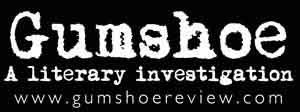 Top crime fiction blog Gumshoe Review rates my new Palestinian crime novel THE FOURTH ASSASSIN very highly: "Rees does an excellent job of showing the pressures on the young Palestinians and describing the microcosm of one immigrant community within the U.S. The mystery also contains plenty of twist and turns." Read Mel Jacobs's full review.
Top crime fiction blog Gumshoe Review rates my new Palestinian crime novel THE FOURTH ASSASSIN very highly: "Rees does an excellent job of showing the pressures on the young Palestinians and describing the microcosm of one immigrant community within the U.S. The mystery also contains plenty of twist and turns." Read Mel Jacobs's full review.If you feel compelled to read any other crime fiction but mine -- or if you've already read all my books -- I'd direct you to a list of the 100 Best Crime Books on the Court Reporter blog. Many of the selections are hardly surprising -- you're not likely to say to yourself, "Oh, The Maltese Falcon, how'd they come up with that?" Well, if you DO say that, then you've probably got 100 new books for your nightstand, because surely you can't have read any crime fiction BEFORE you read The Maltese Falcon. That's just unacceptable! Anyway, much of the rest of the list comprises overrated twaddle (dragon tattoos, for example) which has somehow become accepted as a staple of the genre (several genres in fact, because the list includes true crime, thrillers and slasher stuff), classics which to those who bother to read them these days will be head-scratchingly dull, and many others which are fiendishly outdated to the modern reader (yes, Sherlock Holmes fans, I'm talking to you). But you may find something you didn't know about, so take a look.
Published on March 02, 2010 02:21
•
Tags:
bay-ridge, blogs, brooklyn, court-reporter, crime-fiction, dashiell-hammett, gumshoe-review, lists, little-palestine, mel-jacobs, new-york, palestine, palestinian, reviews, sherlock-holmes, stieg-larsson, the-fourth-assassin, the-girl-with-the-dragon-tattoo, the-maltese-falcon, united-nations
Coffee cultures of Israelis, Palestinians...and Hawaiians
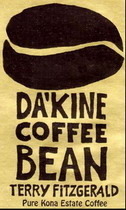 I have a lot of good reasons for staying in the Middle East as long as I have. I admit the main thing keeping me here 14 years and counting may really be inertia, but I also relish being an outsider, researching my Palestinian crime novels on site, visiting the Palestinian towns whose atmosphere of violence, decay and liveliness makes me feel so creative.
I have a lot of good reasons for staying in the Middle East as long as I have. I admit the main thing keeping me here 14 years and counting may really be inertia, but I also relish being an outsider, researching my Palestinian crime novels on site, visiting the Palestinian towns whose atmosphere of violence, decay and liveliness makes me feel so creative.Still, let’s get real: I’m here for the coffee.
There’s no place outside Italy where there’s a more sophisticated coffee culture than Israel, and nowhere on earth do you find yourself cajoled into drinking as much coffee as Palestine.
When I first arrived here, Israelis were drinking one of two kinds of execrable coffees. Middle-aged ladies seemed to go for “Nes,” which despite being the Hebrew word for “miracle” signified only that it was Nescafe instant, served with water so hot that it’d be a miracle if you could taste anything and with enough milk to make it look about the same shade as the skin of the sun-loving ladies who drank it. The alternative was “botz,” which is the Hebrew word for mud. To sum that up: why drink the liquid when you can also have the grounds stuck between your teeth for an hour or two?
In the last decade, however, the number of cafes – hip and less so – in Israel has risen sharply. Everywhere you go, even in Jerusalem and let alone in trendy Tel Aviv, there are bars offering top international brands from the ubiquitous Lavazza to Caffe Mauro and Bristot. It’s an Italian-style espresso-drinking culture and in some of the cafes they even understand how to maintain their espresso machines, thus guaranteeing a good cup.
See, at least there’s one thing about Israel which hasn’t gone to hell in a handbasket over the last decade. Don’t let anyone say I don’t look on the bright side.
Palestinians haven’t changed their style, however. (Which now that I think of it is also a good reflection of their role in the so-called peace negotiations over the past decade.) The way most of them like their coffee is cooked in a narrow-topped tin pan, boiling it over a gas flame with some sugar. “Masbuta,” or “just right,” for coffee with some sugar. “Sada,” or “bitter,” for funerals – and of course for Omar Yussef, the hero of my crime novels.
When in Palestinian towns, you’re greeted at every meeting by a small cup of thick coffee. You have to wait for the grounds to settle and then drink it before you can move beyond the small talk and get down to business. Every meeting, all day. Until you’re buzzing and wondering why all the colors are so bright, even though you’re inside and the shades are drawn. You’re also curious about the stabbing pains in your urethra….
Not that I only have coffee when I go out. Four years ago I quit journalism to work from home on my fiction. I get a monthly delivery of Lavazza for my home machine. It comes straight from the importer. Perhaps it’s the quantity I consume, but they seem to believe they’re delivering to a business address. Naturally I tell them I have an extensive staff, each of whom needs a lot of coffee, and that’s why they need to make an extra delivery again this month…
So with coffee being that central to my existence here, I was particularly intrigued to hear from a reader of my novels – and of this blog – named Terry Fitzgerald. TF informed me that my fellow blogger and terrific author of Bangkok crime novels Christopher G. Moore had signaled his approval of Terry’s Da’kine Coffee Bean, which he produces in Honaunau, Hawaii. He kindly offered to send me along a batch.
Now I used to be a journalist – when someone offers me something free, I’ll go to extraordinary lengths to secure it. In this case, I made several visits to my local branch of the Israeli Postal Service whence I eventually was able to wrest a bag of Terry’s prize-winning bean. (Check him out).
I’ve offered Da’kine to some Israeli friends, who commented with pleasure on its redolence of the most deliciously bitter of dark chocolate. I took it into Bethlehem for a rendez-vous with the real Omar Yussef. He drank it without sugar and with approval. As is traditional for a Palestinian when accepting a coffee, he said: “May Allah bless your hands. May there always be coffee in your home.”
This brand, too, I hope.
(I posted this on International Crime Authors Reality Check, a joint blog for me and three other authors of -- obviously -- international crime novels. Take a look.)
Published on March 03, 2010 23:03
•
Tags:
arab-coffee, blogs, botz, bristot, caffe-mauro, christopher-g-moore, coffee, da-kine-coffee-bean, espresso, hawaii, hawaiian, honaunau, israel, israeli, jerusalem, lavazza, masbuta, middle-east, nescafe, omar-yussef, palestine, palestinian, sada, tel-aviv, terry-fitzgerald
Why I love clogged Arab toilets better than Amazon Kindles
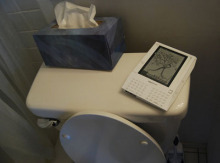 As I travel the Middle East to research my Palestinian crime novels, I love to come upon a stinking squatting-toilet, its evacuation hole bubbling with dark, sinister turds and the air strong with the scent of barely digested, unhygienically prepared lamb kebab. I adore such a khazi on sight, because no one cleaned it up for me or tried to create an illusion that it was just like a toilet in Manhattan or Munich or my mother’s house.
As I travel the Middle East to research my Palestinian crime novels, I love to come upon a stinking squatting-toilet, its evacuation hole bubbling with dark, sinister turds and the air strong with the scent of barely digested, unhygienically prepared lamb kebab. I adore such a khazi on sight, because no one cleaned it up for me or tried to create an illusion that it was just like a toilet in Manhattan or Munich or my mother’s house.That toilet is suddenly all around me and it’s real, down to the ragged little cloth and the old watering can for washing myself afterwards. I can even remember the most spectacularly smelly ones, like the reeking mess of my hotel toilet in Wadi Moussa, Jordan, where I paid $1.60 per night for a room, or the delightful filth of the Fatah headquarters in Nablus.
According to Virginia Heffernan, The New York Times television and “media” columnist, the sensuous depth of my experiences with Palestinian toilets is worthless. Every time I crap, I ought to be doing it in a replica of the Tokyo hotels which spray your backside with hand cleansing soap solutions, whether you like it or not.
How did Heffernan get into my toilet habits? Well, she didn’t. Actually she told me that the scent of books not only doesn’t matter but is a subject she finds tedious. The “aria of hypersensual book love is not my favorite performance,” she writes this week. “I sometimes suspect that those who gush about book odor might not like to read. If they did, why would they waste so much time inhaling?”
So if you like food, do you have to choose one sense as the limit of your experience? If you're invited out to eat with Heffernan: Don’t look at the plate and don’t savor the aroma; just eat the bloody thing.
The lady ought to get out more and think about her own senses. Most people only seem to notice smell when it makes them wrinkle their nose in disgust.
Whenever I’m in a Palestinian town, I can hardly breathe for all the sniffing I do. Strong cigarettes, body sweat, dust that seems superheated, donkey dung, cardamom from the coffee vendor and other spices in sacks outside a shop. The connection between scent and memory is in fact much stronger than the link between sight and our memories.
So forgive me if I go home from the Palestinian john and give my library the same attention.
I should add that Heffernan’s weird article posits the arguments of the great philosopher Walter Benjamin in favor of the love of a library, its scents and sense of touch. She then puts forward her argument in favor of e-readers which is that… Well, as far as I can see it’s just that she thinks Benjamin would probably have liked the Kindle, even though all the things he says he likes about books in his essay on collecting books don’t conform to the Kindle experience (except for the actual words you read).
It’d be like me writing that my old college tutor Terry Eagleton (author of “Walter Benjamin, or Toward a Revolutionary Criticism” 1981) wanted to elucidate a way for socialist literary critics to utilize new French deconstructionist techniques (true), only to add that he’d probably think Heffernan was a tasty bit of crumpet (probably true, knowing Terry, but no more than a hunch on my part.)
I’m not against the Kindle or other e-readers. I think it’s quite possible that many people will read more because of the ease with which they can download a range of works onto their little screens. One of my good friends here in Jerusalem loves his Kindle and has noted that, while I have to wait weeks for my books to be delivered, he can be reading whatever he wants in the seconds it takes to download a digital file.
My pal also points out that e-readers might be good for authors in the end (despite the fears of publishers) because he can’t lend my books once they’re bought on his Kindle. He has to buy another copy as a gift. See, I’m all for that.
Heffernan’s argument falls in line with the thoughtless cool accorded often-useless gadgets by people who haven’t looked beyond the sleek design and beeping sounds. (By this I mean the following conversation which I’m sure you’ve all experienced: “It’s cool.” “Why?” “It’s just cool, man.”)
Heffernan bloviates about scrolling through her “odorless dustless Kindle library,” comparing that with a dusty, odoriferous real library. But when she’s scrolling, she oughtn’t to compare herself to people who love books. The best comparison is to people who love card catalogues, because she isn’t looking at the books, only at their titles and some other referents.
“I have literally no memory of opting to get any of these books on Amazon,” she writes as she breezes down the list of contents on her snazzy device. That, Virginia dear, is because though it’s called a “Kindle,” you’re reading a computer. When I look at my computer, I often can’t remember when I wrote any number of blog posts or news stories based on a perusal of their file names. A few words in a digital list are nothing more than that. They have no design, no sensual triggers, no other association at all.
But I remember where and when I bought almost every book I own. (I also have a special place in my heart for the ones I stole as a teenager, but it turns out that might be easier to do with digital devices as well. Another thrill of youth lost to new technology.)
“The Kindle delivers a new kind of bliss,” Heffernan concludes. I’m sure it does, though Heffernan can’t tell us what that bliss might be.
Meantime, don’t forget about books. And, in spite of what I wrote above, don’t forget to flush.
(I posted this on a blog I write with three other international crime authors. Check it out. For more of my own blog post, visit my blog: The Man of Twists and Turns.)
Published on March 11, 2010 06:17
•
Tags:
amazon-kindle, arab, crime-fiction, fatah, gaza, jerusalem, jordan, kebab, media, middle-east, nablus, palestine, palestinian, squatting-toilet, television, terry-eagleton, the-new-york-times, toilet, tokyo, virginia-heffernan, wadi-moussa, walter-benjamin, west-bank
In Nablus, the price is right
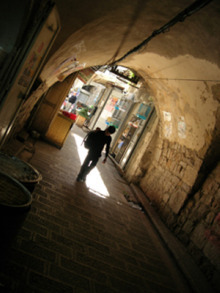 I was tucking into a slice of qanafi at my favorite vendor in the Nablus casbah yesterday when a gang of Palestinian reporters and officials intruded on my guilty pleasure. This was at Aqsa Sweets, which readers of THE SAMARITAN'S SECRET will know as the place favored by the hero of my Palestinian crime novels Omar Yussef because it has a perfect blend of the cheeses of different Syrian and Palestinian goats in its qanafi (topped by semolina and drenched in syrup.)
I was tucking into a slice of qanafi at my favorite vendor in the Nablus casbah yesterday when a gang of Palestinian reporters and officials intruded on my guilty pleasure. This was at Aqsa Sweets, which readers of THE SAMARITAN'S SECRET will know as the place favored by the hero of my Palestinian crime novels Omar Yussef because it has a perfect blend of the cheeses of different Syrian and Palestinian goats in its qanafi (topped by semolina and drenched in syrup.)Mayor Adly Yaish was among the crowd. As he steamed his way through a plate of qanafi, he informed me that he, the Nablus region's governor, and the city's police chief were touring the casbah to draw attention to a law soon to come into effect that'll make it mandatory for vendors to show their prices. It's one of the economic reforms introduced by Prime Minister Salaam Fayyad, a Nablus native, intended to change the chaotic and often corrupt nature of the Palestinian economy.
A few minutes of jawboning with me about their hopes that my books will show the true Nablus (I think they do, but I didn't remind them that I write crime fiction), a forkful of qanafi raised for the cameras, and then the dignitaries were off into the narrow alleys in search of price tags.
I settled in to complete my lunch -- not a balanced diet, I know, but then my mother doesn't read this blog so I don't have to pretend to be watching what I eat. I washed it down with tea from a fellow who wandered in with an enormous pot and a cup of sugar in his apron.
Nablus is famous throughout the Arab world as the best place for qanafi. And Aqsa Sweets is the best qanafi in Nablus, thus the best in the Arab world and, obviously, in the world. You wouldn't know it. The place is floor to ceiling white ceramic tiles, as though they expected to hose it down at the end of the day. Up front there are two big burners with wide trays of orange qanafi. The surly fat kid who serves you slings it onto the table as though he thought frisbees were made of hot goat's cheese and syrup.
As for price, nothing's marked. For 4 shekels (a bit more than a dollar), you get 125 grams of qanafi. It doesn't look like much, but if you try to eat more than that, you'll either stagger out hoping never to see another piece of the stuff in your life, or you might just curl up and die in the corner of sugar-shock.
I went up Mount Gerizim, one of the two mountains whose steep sides form the valley in which Nablus lies. At the top I found my old pal Hosny Cohen, a Samaritan priest, in exultant mood. He's shifting his Samaritan Museum and Cultural Center to a bigger room.
"I've had two tour groups this morning, each of forty people," he said, leaning on his cane and pushing his fez forward neatly over his brow. "I don't have energy for you."
Then he proceeded to talk for an hour without stopping. When I was about to leave, he came after me and said: "I forgot to show you the 'mezuza' we put above the door..."
Which is why I can't help liking the Middle East.
Published on March 16, 2010 10:54
•
Tags:
adly-yaish, aqsa-sweets, crime-fiction, dessert, food, goats, hosny-cohen, mayor, nablus, palestine, palestinian, prime-minister, qanafi, salaam-fayyad, samaritans, syria, the-samaritan-s-secret
Jimmy Carter, apartheid, hemorrhoids and Matt Beynon Rees
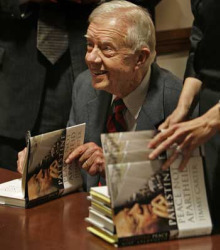 I often receive emails from book stores, amazon.com, Barnes and Noble, and online literary sites telling me how much I’d like the novels of Matt Beynon Rees. I’m delighted to see these emails, which are based on my other purchases and interests, as only I can truly know just how much the novels of Matt Beynon Rees have changed my life. (Try them, I’m sure you’ll agree.)
I often receive emails from book stores, amazon.com, Barnes and Noble, and online literary sites telling me how much I’d like the novels of Matt Beynon Rees. I’m delighted to see these emails, which are based on my other purchases and interests, as only I can truly know just how much the novels of Matt Beynon Rees have changed my life. (Try them, I’m sure you’ll agree.)Of course, I also get the occasional email informing me that if I like Matt Beynon Rees, I might also enjoy another author named in the email. Well, they’re half-way there, because of course I DO like Matt Beynon Rees. No ifs. So I always have to look to see if they’re right about the second part.
The links are sometimes obvious – “if you like Matt Beynon Rees, try [insert crime novelist’s name here:]” – and occasionally baffling though thought-provoking. I had one a few weeks back suggesting fans of Matt Beynon Rees’s Palestinian crime series would really dig a nonfiction book about a cyclone that hit Burma in 2008.
The latest of these connections was no doubt the most bizarre. I clicked on an email from an online book blog a few days ago: “If you like Matt Beynon Rees, we think you’ll enjoy Jimmy Carter.”
Wow, I thought, how did they know that I, too, have lusted after women in my heart.
It could be that the connection was the result of the review of the paperback version of my third Palestinian crime novel THE SAMARITAN’S SECRET in The New York Times—it was featured in the same column as a review of the softcover edition of the 39th President’s ultra-controversial 2006 work of nonfiction “Palestine – Peace Not Apartheid.”
Now here’s where I part with the “If you like Matt Beynon Rees, we think you’ll enjoy Jimmy Carter” email. Of you like Matt Beynon Rees, you’ll probably enjoy crime fiction. Or just fiction. Rather than “Palestine – Peace Not Apartheid,” in which the loveable old peanut farmer from Georgia accuses Israel of the worst kind of discrimination against Palestinians in the West Bank.
I don’t have an opinion on Jimmy’s book. I never read it. It has “Palestine” in the title and, as Graham Greene wrote, once one has lived in a place for a while one ceases to read about it.
Also it has “Apartheid” in the title. I have an opinion about what Israel does in the West Bank. I’m not going to get into it here, but in a (pea)nutshell, I think it’s a mistake to compare Israeli policy to apartheid, because then the debate shifts to the similarities and differences between South Africa’s old regime and Israel’s occupation – instead of talking simply about what Israel does and what’s wrong with it.
As soon as Smiling Jim put “apartheid” in his title, his book’s content was largely ignored. Pro-Israel mouthpieces could condemn him as an anti-Semite simply for comparing Israel to the unlamented and certifiably pariah regime in Pretoria. Game over. Jimmy even issued an apology a couple of years ago to all Jews on Yom Kippur. As though saying something critical of Israel is somehow a criticism of all Jews. As though there weren’t any Jews who agreed with him about Israel’s policy toward the Palestinians. Game over with a slamdown.
For me, as for many others, Carter has been a mildly useful voice for decency in the world. Though he also represents something a little pitiful, as one might witness in the song “Jimmy Carter” by my favorite band, Detroit whacksters Electric Six:
“Like Jimmy Carter,
Like electric underwear,
Like any idea that never had a chance of going anywhere….”
However, the decisive element in the question “If you like Matt Beynon Rees, we think you’ll enjoy Jimmy Carter” is a matter of personal animus. In fact, it’s a family insult suffered by the Rees’s of 32 Neath Road, Maesteg, Mid-Glamorgan, Wales, at the hands of James Earl Carter Jr., 1600 Pennsylvania Avenue, Washington, D.C.
My grandfather Tom Rees read in the Western Mail that then-President Carter was suffering from hemorrhoids. Tom had faced the same ailment some years before and had found nothing eased the feeling of defecating broken glass, until he switched to Allinson’s wholewheat bread. He wrote a letter to the White House in his careful cursive script, letting the leader of the Free World know what he needed to do to poop painlessly.
He didn’t expect any public recognition. But he assumed he’d get a polite note.
Perhaps Carter’s people knew that my grandfather was a former Communist Party member and figured the brown bread was a plot of some sort to keep the Commander-in-Chief on the can and away from the nuclear button, while the Reds swarmed Capitol Hill. In any case, the President never wrote back. Not even a “President Carter has read your inquiry with interest, but regrets that he will not be able to make it part of United States planning and policy at this time, though he is sympathetic to your cause.”
My grandfather continued to consume wholewheat bread, even at a time (the 1970s) when those around him considered it to be a strange fad akin to today’s no-nightshades tomato-free diets.
That’s why I don’t like Carter. Not because of apartheid. Because of hemorrhoids.
I wonder if Jimmy ever got them cured. Maybe he mentions it in his book. Perhaps I ought to read it after all…
Published on May 20, 2010 06:43
•
Tags:
amazon-com, apartheid, barnes-and-noble, crime-fiction, detroit, electric-six, fiction, georgia, glamorgan, graham-greene, hemorrhoids, israel, jews, jimmy-carter, maesteg, matt-beynon-rees, middle-east, new-york-times, palestine, palestine-peace-not-apartheid, palestinian, pennsylvania-avenue, pretoria, south-africa, the-samaritan-s-secret, wales, washington, west-bank, white-house, yom-kippur



